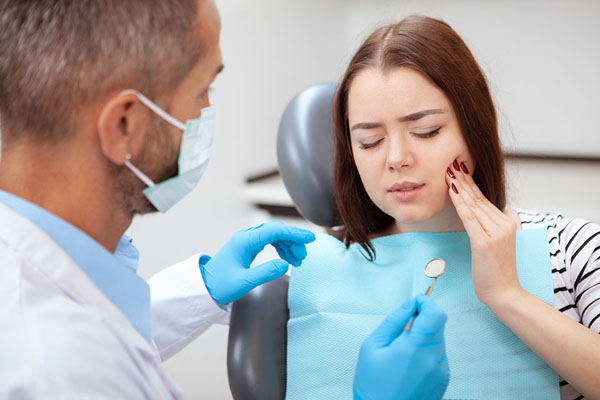Internal Joint Derangement Treatment in Knoxville, TN
Find Relief from TMJ Disorders with Our Local Knoxville Dentist
Living with chronic jaw pain doesn’t have to be your reality. If you’re experiencing symptoms of temporomandibular joint disorders, our experienced TMJ dentist in Knoxville, TN, is here to help. We diagnose and provide treatment for internal joint derangement and other temporomandibular disorders, providing comprehensive care that addresses both your immediate pain and long-term oral health.
Ready to find relief? Contact our Knoxville dental office at (865) 687-8670 today. We proudly serve patients throughout East Tennessee, including Knoxville, Amherst, Marble City, West Knoxville, and surrounding communities.
What Is Internal Joint Derangement?
Internal joint derangement (internal derangement) is a specific type of temporomandibular joint disorder where the structures within your jaw joint—including ligaments, cartilage, and the TMJ disk—become damaged or displaced from their normal position. This condition affects the intricate sliding motions of your temporomandibular joint, leading to significant pain and limited jaw movement.
Unlike simple muscle tension or myofascial pain, internal joint derangement involves actual structural changes within the jaw joint itself, making professional treatment essential for long-term relief.
Types of Internal Joint Derangement
Understanding the different forms of disc displacement helps our Knoxville TMJ specialists determine the most effective treatment approach:
Disc Displacement With Reduction
Disc displacement with reduction is a common form occurring when your TMJ disk shifts out of position but returns to its normal position during jaw opening and closing. Key characteristics include:
- Distinctive clicking or popping sounds when opening your mouth
- Generally allows for normal maximum opening
- May cause mild to moderate TMJ pain
- Often, the first stage of internal joint derangement
Disc Displacement Without Reduction (Locked Jaw)
Disc displacement without reduction is a more severe condition that happens when the displaced disc remains stuck and cannot return to its proper position. Symptoms include:
- Sudden limited opening (often less than 35mm)
- Absence of clicking sounds (the joint becomes “quiet”)
- Significant pain and difficulty with jaw movement
- Challenges with chewing, speaking, and normal daily activities
- May develop into degenerative joint disease if untreated
Posterior Disc Displacement
Posterior disc displacement is a less common but serious form where the disc moves backward, often causing:
- Severe pain when attempting to open the jaw
- Grating sounds during movement
- Rapid progression to degenerative changes
Common Symptoms of TMJ Disorders
Recognizing the symptoms of internal joint derangement early can prevent progression to more severe cases. Watch for these warning signs:
Primary Symptoms:
- Persistent jaw pain, especially on the affected side
- Limited jaw movement or restricted opening
- Clicking, popping sounds, or grating sounds during jaw movement
- Sudden jaw locking episodes
- Difficulty chewing certain foods
Secondary Symptoms:
- Chronic headaches and neck pain
- Ear pain and tinnitus (ringing in the ears)
- Referred pain extending to the temples and cheeks
- Facial muscle tension and spasms
- Changes in bite alignment
When experiencing symptoms of TMJ disorders, don’t delay seeking treatment. Early intervention often leads to better outcomes and can prevent the need for more invasive procedures. Call our dental office at (865) 687-8670 today to schedule a consultation with our Knoxville dentist.
What Causes Internal Joint Derangement?
Various factors contribute to the development of temporomandibular disorders:
- Direct Trauma and Injury: Jaw joint issues can arise from motor vehicle accidents, facial or jaw sports injuries, and falls or impacts to the temporal bone area.
- Degenerative Changes: Rheumatoid arthritis, osteoarthritis, and age-related wear can negatively impact the jaw joint, causing discomfort and reduced mobility.
- Behavioral and Lifestyle Factors: Bruxism and clenching, chronic gum chewing, poor posture, and high stress levels can all contribute to jaw issues by placing extra stress or affecting alignment and muscle tension.
- Anatomical Factors: Prior jaw joint issues, joint hypermobility, and articular eminence abnormalities can increase the risk of future jaw problems.
Comprehensive Treatment Options for Internal Joint Derangement
Our Knoxville TMJ dentist near you explains a full spectrum of treatment options, tailored to your specific condition and symptoms:
Conservative Treatment Approaches (First-Line Therapy)
Pain Management:
- Nonsteroidal anti-inflammatory drugs (NSAIDs) for acute inflammation
- Muscle relaxants to reduce muscle tension
- Prescription medications for chronic pain management
Physical Therapy:
- Specialized exercises to improve jaw joint function
- Manual manipulation techniques
- Relaxation techniques for stress-related TMJ disorders
Lifestyle Modifications:
- Dietary changes to reduce jaw strain
- Good posture training
- Stress management strategies
Intermediate Interventions
Oral Appliances:
- Custom night guards to prevent teeth grinding
- Repositioning splints for disc displacement
- Stabilization appliances for joint protection
Injection Therapies:
- Corticosteroid injections for inflammation
- Trigger point injections for myofascial pain
- Hyaluronic acid injections for joint lubrication
Advanced Treatment for Severe Cases
When nonsurgical treatments don’t provide adequate relief, surgical options may include:
- Arthroscopic surgery for disc repositioning
- Open joint surgery for severe displacement
- Joint replacement in cases of extensive degenerative changes
Comprehensive Evaluation by Your Knoxville TMJ Dentist
Accurate diagnosis is crucial for effective treatment. Our thorough evaluation process includes:
Clinical Assessment
- Detailed medical history focusing on TMJ symptoms
- Comprehensive physical examination of jaw function
- Evaluation of jaw opening range and movement patterns
- Assessment of muscle tension and trigger points
Advanced Imaging Tests
- Digital X-rays: Initial screening for bone abnormalities
- MRI Imaging: The gold standard for evaluating disc position and soft tissues
- CT Scans: Detailed bone structure analysis when needed
- Cone Beam CT: 3D imaging for complex cases
Functional Analysis
- Bite analysis and occlusal evaluation
- Joint loading tests
- Movement pattern assessment
Frequently Asked Questions
East Tennessee’s humid climate can sometimes affect joint inflammation. Additionally, stress from traffic on I-40 and I-75, along with seasonal allergies common in our area, may contribute to muscle tension and TMJ flare-ups.
Treatment duration varies depending on severity. Conservative treatments may show improvement in four to eight weeks, while more complex cases requiring surgical intervention may need three to six months for full recovery.
Yes! Early intervention, stress management, avoiding hard foods, limiting chewing gum, and maintaining good posture can prevent progression. Regular check-ups with our Knoxville TMJ specialist help monitor your condition.
Find Relief for Internal Joint Derangement Symptoms. Schedule Your Consultation!
Don’t let jaw pain control your life. Whether you’re experiencing symptoms for the first time or have been dealing with chronic TMJ disorders, our experienced team is here to help you find relief.
Contact our Knoxville TMJ dentist today at (865) 687-8670. We proudly provide expert TMJ care to patients throughout Knoxville, TN, and surrounding areas such as West Knoxville, Amherst, and Marble City. We’re committed to providing the comprehensive, compassionate care you deserve for your temporomandibular joint disorders.


